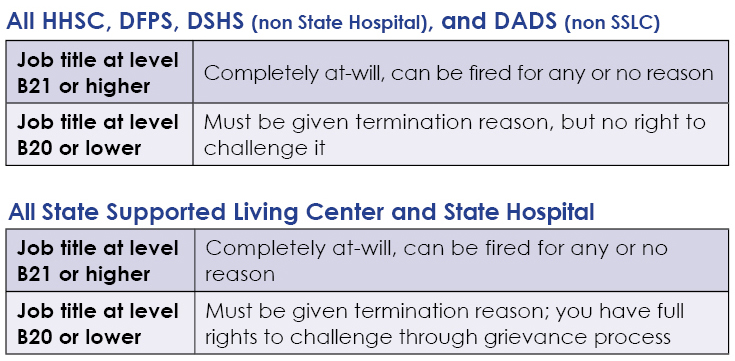TSEU members launch campaign to restore grievance procedure
 In May, the Health and Human Services Commission announced eliminating access to the employee grievance procedure for all state workers in HHSC, DADS, DSHS, and DFPS, except those who work at a state hospital or state supported living center. This change reverses the long-established right of state employees to challenge unjust terminations and demotions. Without a grievance procedure, thousands of state workers are vulnerable to being unfairly fired or disciplined with no way to dispute. For all state employees in an HHSC agency (including state hospitals and SSLC’s) whose position is ranked at B21 or higher, the new policy makes them entirely “at-will.”
In May, the Health and Human Services Commission announced eliminating access to the employee grievance procedure for all state workers in HHSC, DADS, DSHS, and DFPS, except those who work at a state hospital or state supported living center. This change reverses the long-established right of state employees to challenge unjust terminations and demotions. Without a grievance procedure, thousands of state workers are vulnerable to being unfairly fired or disciplined with no way to dispute. For all state employees in an HHSC agency (including state hospitals and SSLC’s) whose position is ranked at B21 or higher, the new policy makes them entirely “at-will.”
While the policy change claims that employees ranked below the B21 classification won’t be technically “at-will,” stripping away access to the grievance procedure effectively makes them at-will because there will be nothing to stop the agency from firing someone for unjust or fabricated reasons.
What does at-will mean?
At-will means that an employee can be fired for any legal reason, or no reason at all. With at-will, an employee can be simply told “you’re fired,” without any justification or warning. This opens the door to a whole range of illegal or unethical reasons for termination- as long as the employer doesn’t say they are firing you for an illegal reason, they will be allowed to do so.
Why is a grievance procedure important?
A grievance procedure provides a fair and transparent way to resolve disputes between employees and their employer. With it, the burden is on the employer to prove why an employee should be disciplined or terminated. If an employee speaks up about illegal or unethical behavior on the part of management, they can be reasonably assured that they will be protected against retaliation. Without it, the door is open for abusive forms of supervision, for retaliation, for arbitrary terminations, and for discrimination. Without a grievance procedure, the employee has no opportunity to challenge whatever justification their employer has given for firing them.
State employees are frequently blamed for failing to keep up with unreasonable workloads and expectations. Without a grievance procedure, employees will be scapegoated and fired even more often for problems beyond our control- such as short-staffing.
Why this will hurt state services, state workers, the public
State employee whistleblowers call attention to major abuses of power or actions that cost taxpayers millions of dollars. Without a grievance procedure, whistleblowers will be vulnerable to retaliation from higher-ups who want to punish them for speaking out.
Additionally, taxpayers will see big increases in legal costs in state agencies. Without a grievance procedure to settle employment disputes, terminated employees will have no other option but to sue the state when they feel they have been treated unfairly.
